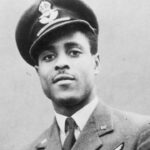My husband ran a newspaper that was very critical of Hissene Habré and one day men came to get him. Our house was completely ransacked but my husband and I managed to escape. I left with nothing but a pair of jeans and as we ran we heard gunfire and we saw corpses lying in the streets.
While we were in exile in the Republic of Congo, we heard that people were murdered back home in Chad. We heard that entire villages were burnt to the ground. People had no homes and had to sleep outside in the fields. There wasn’t a single family that wasn’t touched by this war. In my own family I think I lost about 20 relatives. I had an uncle who worked in a cotton factory and he was kidnapped in front of his children. I had another uncle who was a policeman, they killed him by cutting his throat. I had a younger cousin who was pregnant when her husband was murdered right in front of her. It was the darkest time in Chad’s history.
After training in exile as a lawyer, I came back to Chad, it was totally different. There was a complete divide in the country and everyone was saying I’m from the north or I’m from the south. Before it didn’t matter if you came from the north or south but now it defined everything. I hated it and I’m a person who loves people and I believe in unity. So when I see people being tribal and divided, I can’t be happy.
Taking down Hissene Habré
I got involved in the effort to take Hissene Habré to trial because I wanted justice. Terrible things had happened in Chad and Hissene Habré and his men were all complicit in this but they had suffered no consequence. As long as there’s impunity there would be human rights abuses. So something had to be done. Every single family I knew had been affected by the violence. How were we going to move on if we didn’t get any justice?
I knew it would be dangerous so even my family tried to persuade me not to get involved. They threatened to cast me out of the family, to disown me but there was nothing that would stop me. I had every confidence that I would get him, that I would succeed but I didn’t know when. I just knew that one day I would be face to face with Hissene Habré in court.
Travelling around Chad searching for evidence, I met prisoners that had been starved, tortured, some had lost their limbs, some were blind and some had been raped. Rape in particular was difficult to talk about. It’s a taboo issue in Chad. So it took years to convince women to open up and to talk about it.
I talked to a woman who was accused of being a spy and the authorities arrested her daughter, a girl who was only 13 years old at the time. The daughter was locked up in a police station for over a year and then they arrested her mother. They were both raped and used as sex slaves by the soldiers and they had never talked to anyone about it. It took a long time for them to trust me but when they did, it felt like a real breakthrough.
Then Jacqueline Moudeina visited the infamous swimming pool, ‘La Piscine’.
La Piscine
It was an empty swimming pool that Hissene Habré’s men turned into a detention centre; it was underground and had no ventilation. It was boiling hot, it stank, and was absolutely filthy. There was excrement on the floor and bits of old chicken bones. Prisoners would die from heat and from torture. Some prisoners had gas squirted into their eyes and some were put into rooms with decomposing bodies. It was like something from a horror movie.
Our team found documents. These were records kept by Hissene Habré’s men. They were mainly lists. People who had been arrested, killed, people who had been tortured and interrogated. We found death certificates. We even found letters that Amnesty International had sent to Hissene Habré with the names of people they wanted to be released.
We found all kinds of different documents. Finally, the evidence I’d been looking for was right in front of me. At that moment, I knew we could put Hissene Habré on trial. Finally we had proof of his atrocities.
Filing the case
Jacqueline Moudeina travelled to Senegal to file a criminal case against Hissene Habré in the Extraordinary African Chambers, a tribunal created by the African Union in collaboration with Senegal to try international crimes committed in Chad between June 1982 to December 1990.
He was charged with torture, crimes against humanity and war crimes.
The women who she convinced to testify in court told their stories. The tribunal heard and established a separate new case against Hissene Habré for the alleged crime that he committed sexual violence by raping the women during his reign of terror and dictatorship.
On 30 May, 2016, two decades after Jacqueline Moudeina had returned to Chad to start this work, the verdict came – The court found Hissene Habré guilty of crimes against humanity, war crimes and torture including sexual violence and rape.
He was sentenced to life in prison.














